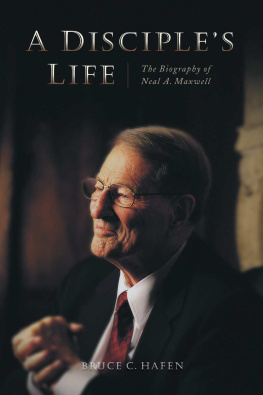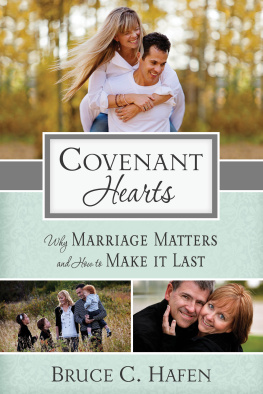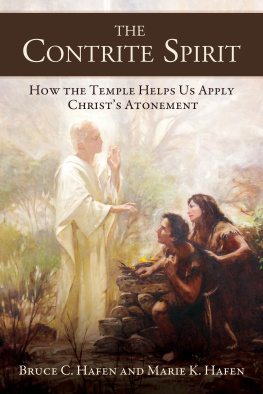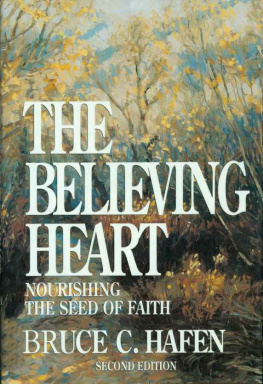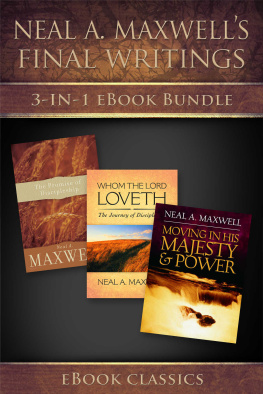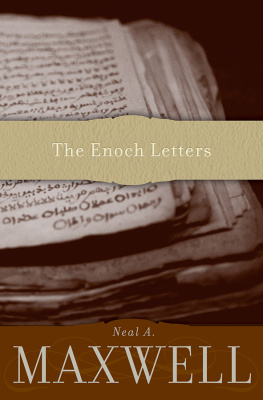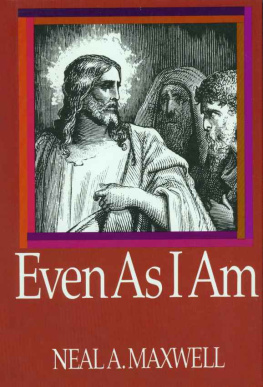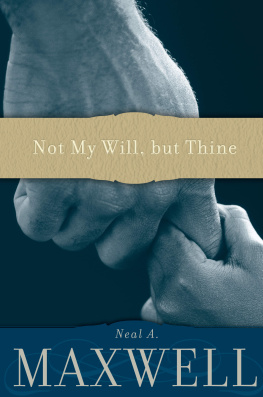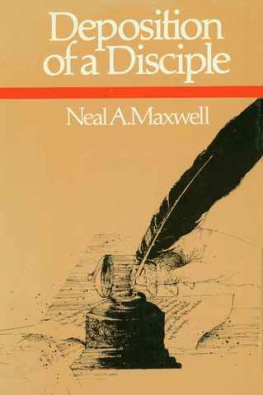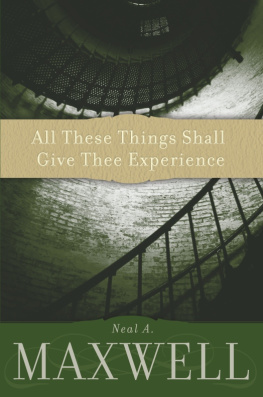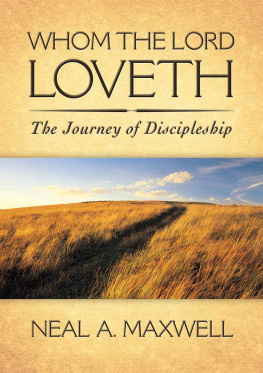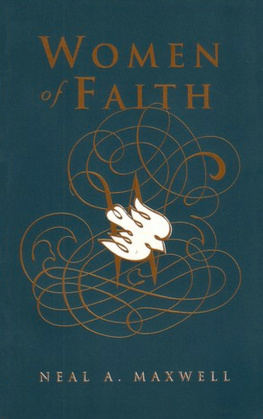A Disciple's Life
The Biography of Neal A. Maxwell
Bruce C. Hafen
2002 Bruce C. Hafen and Neal A. Maxwell.
All rights reserved. No part of this book may be reproduced in any form or by any means without permission in writing from the publisher, Deseret Book Company, P.O. Box 30178, Salt Lake City Utah 30178. This work is not an official publication of The Church of Jesus Christ of Latter-day Saints. The views expressed herein are the responsibility of the author and do not necessarily represent the position of the Church or of Deseret Book. Deseret Book is a registered trademark of Deseret Book Company.
Preface
The story behind the writing of this book really began in 1976, when Elder Maxwell invited me to take a leave from Brigham Young University and work for two years under his daily direction in the new Correlation Department at Church headquarters. In later years, when I was an administrator and a teacher at Ricks College and then at BYU, I saw him often in Church Educational System meetings, where he was a key figure on the Church Board of Education.
In 1996 I was called to the Seventy and assigned to an Area Presidency in Australia, where I remained until returning to Utah in August of 2000. Like so many other Church members, my wife, Marie, and I were stunned by the news of Elder Maxwell's leukemia in late 1996, and we worried and prayed about his health. During October conference 1999, he invited me to come by his office. As we talked, he indicated he was not certain about his condition. He said he was receiving an experimental treatment but "one of these days" the leukemia just might fully return. That was the main reason, he said, why he'd finally yielded to prodding from others that he allow the writing of his biography. I thought a book on his life story would be wonderful until he asked if I would write it.
As honored as I felt, I honestly thought my doing this was not a good idea. I believed that he, his family, and the Church deserved thorough research and writing, and the work needed to be done at once to maximize the possibility of being published during his lifetime. He shared those hopes. But given the frightening uncertainty about his health; given that acceptable biographies can take years to document and write; given that he hadn't kept a personal journal, which would necessitate additional months of original research; and given that I was half a world away on a Church assignment I replied that someone who could give this project immediate and full-time attention was needed.
Nonetheless, after more visits with Elder Maxwell and with others, within a few days I had agreed to begin the project and to move as quickly as possible. In the weeks that followed, I worried about having committed myself to something as unreachable as this task seemed. As I would awaken to hear the colorful birds that rule those fresh Australian mornings, I would sometimes wonder if indeed, I would hope that I had agreed to write Elder Maxwell's biography only in a dream. Then the reality would hit me again. At times I would remember Nephi's words about the Lord preparing a way for people who have a work to do.
As time went on and as I found able people eager to help, my anxiety gradually subsided. I learned about peaceful intensity. Marie and I increasingly sensed that we had been given a rare privilege and that whatever came of this experience would bless us. As we worked we also prayed often, along with so many others, that the Lord would lengthen Elder Maxwell's life. After such prayers, I would sometimes recall a scriptural phrase I'd first heard him quote: "But if not..." (Daniel 3:18) meaning, we must do everything we can to make this work, and then if it doesn't, "it matters not" (Mosiah 13:9).
Looking back now, especially after having talked at length with Dr. Clyde Ford, Elder Maxwell's oncologist, I know we are all witnesses to a genuine miracle. The preservation of Elder Maxwell's life was not, and couldn't have been, anticipated by medical science. Along with its far more substantial blessings, the miracle made it possible to have a biography that draws on lengthy interviews with him and reflects his having reviewed the entire text. We do not cease to pray that the miracle will continue.
As the project began, I thought perhaps the main theme of Elder Maxwell's life would be his rare contributions to the Church as a role model for educated Latter-day Saints. The evidence from researching his life story, however, revealed a different focus and, hence, the book's title. Discipleship is without question the central message of Neal Maxwell's life and of his teachings. His background and contributions as an educator still matter in fact, they matter even more in light of the more fundamental discovery that his story is, as Sheri Dew said after reading the manuscript, a kind of manual on trying to become a follower of Christ.
At one point, I considered saying something in the book about the characteristics of a modern disciple's life that are common to disciples we meet in the scriptures Peter, Nephi, Paul, Alma, and the others. Elder Maxwell's story is in many ways like theirs. These stories reveal some common elements, both for Disciples (Jesus' followers who are called and given authority, such as Apostles) and for disciples (people who choose to follow Him, regardless of their callings). I soon realized, however, that while it is appropriate for a biography to build on the framework of a core theme like discipleship, the theme could easily intrude enough to detract from the life story. I hope I have avoided that. In any case I can say that Neal Maxwell's quest to become a disciple emerged from the research on his life rather than being imposed on it.
His quest leads to a general observation on why we are drawn to life stories. Why do we read, let alone write, biographies? Since ancient days, we have been taught the gospel by stories. The accounts of the war in heaven, the Garden of Eden, and Cain and Abel are the first stories showing what happens when people try to live God's teachings or don't live them. The New Testament is itself a story about Jesus, who He was, what He taught, and what He did. Christ's life is the story of giving the Atonement. The story of Adam and Eve is the story of receiving the Atonement. As we experience mortality the way our first parents did, struggling with the opposition between good and evil, we can look at Eve or at Adam and say that is the story of my life. Then when we tell our own stories to others, we realize that the cosmic quest to overcome evil and find God is our very personal quest.
Our own testimonies are true and often powerful stories that capture in vivid detail how the Lord blesses us, protects us, changes us, and helps us to overcome. Nothing brings the Spirit into a conversation or a classroom more than hearing people bear honest testimony, not so much by exhortation as by just telling the story of their personal experience.
The scriptures are primarily a collection of stories, given to us because God directed prophets to recount their experiences to His people. In His desire to give us guidance about life, God could have given us a large rulebook or a series of grand philosophical essays. But he didn't. He gave us stories about people like ourselves. Again and again the Book of Mormon writers tell us about some person's experience and say, "And thus we see..."
What do we see from these stories? We can see, for example, that "by small means the Lord can bring about great things" (1 Nephi 16:29) and that if people keep God's commandments, "he doth nourish them, and strengthen them, and provide means" for them to keep going (1 Nephi 17:3). We can see that "the devil will not support his children at the last day" (Alma 30:60), that "the children of men [are quick to] forget the Lord.... And we also see the great wickedness one very wicked man can cause" (Alma 46:89).

